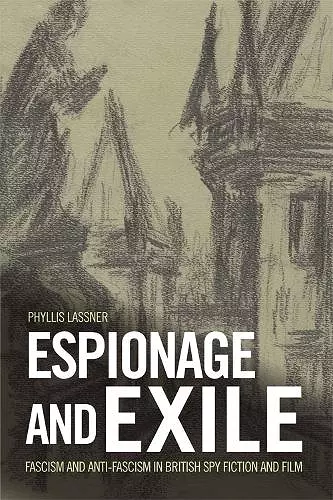Espionage and Exile
Fascism and Anti-Fascism in British Spy Fiction and Film
Format:Paperback
Publisher:Edinburgh University Press
Published:22nd Feb '18
Should be back in stock very soon

Analyses mid-twentieth century British spy thrillers as resistance to political oppression Espionage and Exile demonstrates that from the 1930s through the Cold War British writers Eric Ambler, Helen MacInnes, John le Carré, Pamela Frankau and filmmaker Leslie Howard combine propaganda and popular entertainment to call for resistance to political oppression. Their spy fictions deploy themes of deception and betrayal to warn audiences of the consequences of Nazi Germany’s conquests and later, the fusion of Fascist and Communist oppression. With politically charged suspense and compelling plots and characters, these writers challenge distinctions between villain and victim and exile and belonging by dramatising relationships between stateless refugees, British agents, and most dramatically, between the ethics of espionage and responses to international crisis. Key Features The first narrative analysis of mid-twentieth century British spy thrillers demonstrating their critiques of political responses to the dangers of Fascism, Nazism, and CommunismCombines research in history and political theory with literary and film analysisAdds interpretive complexity to understanding the political content of modern cultural productionOriginal close readings of the fiction of Eric Ambler, John Le Carré and British women spy thriller writers of World War II and the Cold War, including Helen MacInnes, Ann Bridge, and Pamela Frankau as well as the wartime radio broadcasts and films of Leslie Howard
This is a timely critical work in an age of resurgent fascist nationalisms. Scholars and students of modern British fiction and film will benefit from the ethical lines of questioning strongly established by Lassner throughout her oeuvre and which continue in this book. -- Judy Suh, Duquesne University (Pennsylvania) * Cercles *
...a valuable and interesting study, which amply succeeds in bringing to prominence the more subaltern figures of the genre – characters and authors. -- Andrew Glazzard, Royal United Services Institute * George Orwell Studies 1:2 *
Lassner's central argument is original, productive, and persuasive... -- Toby Manning * Jewish Film & New Media, Vol 5, No 1 *
While I can imagine scholars reading selectively, choosing one chapter or another for specific attention, the Conclusion shows how well the book works as a whole, and I would recommend it strongly. -- Mary McGlynn, Baruch College, CUNY * Literature & History 26:1 *
Lassner offers a compelling case for recognizing the political and literary complexity of espionage fiction. -- Erin G. Carlston, University of Auckland * Modernism/Modernity *
...wide-ranging study of twentieth-century spy fiction. -- Oliver Buckton * Studies in the Novel, Vol 49, No 1 *
Espionage and Exile is a perceptive and welcome addition to the field, especially in its movement away from the more familiar analytical approaches to the genre, and towards much-needed fresh ground. -- Sam Goodman, Bournemouth University * The Modern Language Review, September 2017 *
Espionage and Exile is set to advance scholarship in the field of spy fiction. It is original, daring, carefully arranged and argued. Lassner offers a new understanding of espionage literature, one that moves interpretation far beyond the preoccupation with genre, formulae, masculinity, or realism. -- Allan Hepburn, McGill University
ISBN: 9781474431477
Dimensions: unknown
Weight: 399g
272 pages